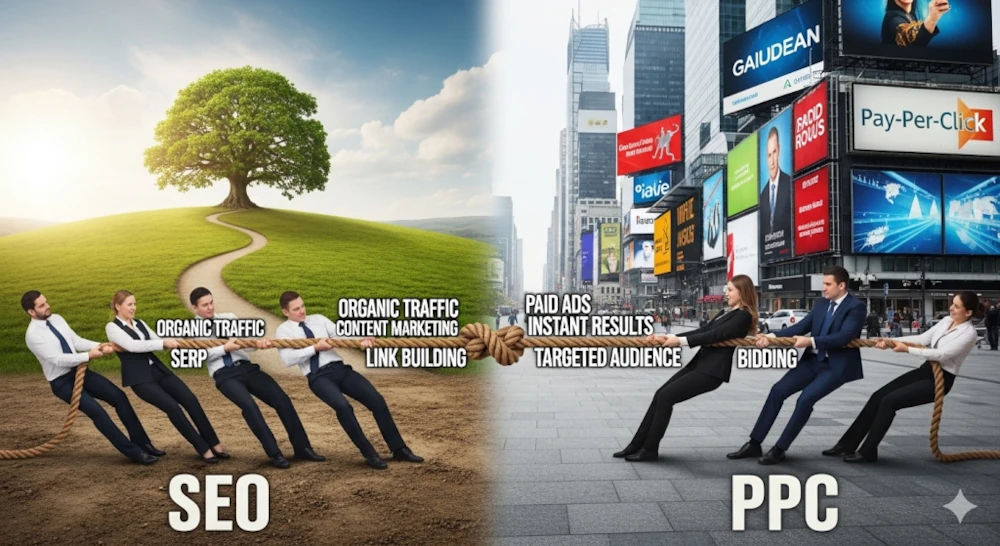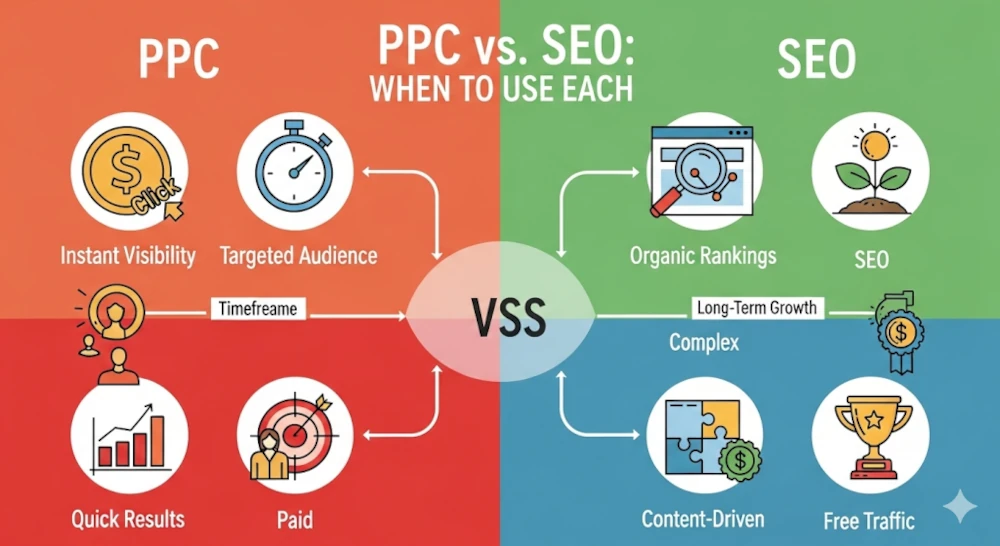
In the rapid development of digital marketing, businesses often face strategic decisions, such as whether to invest in search engine optimization, pay-per-click, or balance both. Each technique brings its strengths, yet selecting the appropriate approach at the right time not only impacts growth in profits but also changes sustainable operations.
A deep understanding of how and when to strategically apply SEO and PPC can maximize the ROI, knowing that digital advancements and technologies now shape the marketplace.
The Role of SEO: Explained
Search Engine Optimization requires steady and long-lasting commitment, which involves the site’s components, such as the structure,keyword-rich content, and technical performance. SEO-optimized websites gradually gain digital authority and foster users’ trust, helping the website get top search results with organic traffic. According to the recent report of Moz’s 2024, approximately 93% of all user clicks are directed to the first page of Google’s Search results, thus showing the high stakes of effective SEO.
A strong SEO offers a cost-effective approach and a powerful method to draw relevant leads who are deliberately searching to make decisions. Businesses aiming for long-term growth, especially in competitive markets like the UK, can benefit from tailored SEO services in London. Since SEO content is discoverable 24/7 and never becomes obsolete, it offers long-lasting rankings and organic traffic. As said above, SEO demands patience and persistence; thus, marketers must monitor Google’s algorithm and track the industry’s trends and updates to help in publishing useful content for users.
The Role of PPC: Explained
Unlike organic strategies in SEO, PPC advertising excels in prioritizing quick exposure and targeted audience control. Marketers can gain the ability to fast-track their search by investing in targeted keywords through using platforms like Google Ads and Bing Ads. Moreover, PPC offers guaranteed exposure by placing the brand on the top search pages in front of users as long as the budget is sufficient.
In a market of dense competition, PPC serves as a reliable shortcut to give a top boost to promotions, product rollouts, and businesses, which SEO might lag. Explore more about the benefits of PPC in digital marketing to see how brands are leveraging this channel effectively.
PPC can narrow the demographic groups with limited advertising tools. Changing the settings location-wise, the kind of audience, device usage, interest, behavior, etc., helps advertisers to reach innumerable audiences from extraneous places. This level of flexibility in PPC becomes ideal for fast feedback loops and supports quick experimentation, unlike SEO.
However, it is not said that PPC is completely flawless, so its efficiency also comes with a set of complexities. Campaigns that lack proper strategy and focus can suffer from inflated ad costs and poor performance. Adding to that, PPC’s biggest drawback is being budget-dependent, which means if ad spending ends, so does their visibility and incoming traffic.
When to Use PPC and When to Stick with SEO

The decision to choose SEO or PPC varies on the basis of business goals or aims, budget, and user-friendly behavior. If startups or small businesses want to establish online authority, then SEO supports long-term organic growth. It strengthens brand recognition, limits marketing expenses, and attracts traffic naturally. In contrast, PPC delivers a fast track to visibility, like product launches or sales, making it perfect for campaign ranking. Learn how PPC ads for new businesses can help emerging brands break through the noise quickly.
Synergy in SEO and PPC enables businesses to optimize both reach and performance. For instance, the insights gleaned traditionally from PPC data are now put to good use for SEO purposes, notably important keyword data and search behavior information.
In the same case, a website with an improved version of organic SEO often tends to earn high-quality scores, helping in reducing the cost-per-click in PPC. Hence, this blended strategy builds a reciprocal relationship where improvement in one area boosts results in another.
How SEO and PPC can maximize Digital Carbon Footprint
In today’s world of climate concerns, digital marketing is shifting towards mindful practices of the environment. When it comes to sustainability, SEO has been considered eco-friendly as it consumes fewer resources and produces less digital waste. If we look into the technical side of SEO, streamlined websites help cut down server loads and create greener browsing experiences. The globally scaled PPC comes with a high frequency of duty tracking and bidding, which makes it a heavier energy consumer than SEO. The transformation in sustainable marketing offers low-impact digital solutions such as carbon-neutral platforms and green servers.
The brands that integrate green initiatives in any digital marketing framework are applicable in both SEO and PPC. The practices that can make lasting green impacts are improving the site speed through backend code, image compression, retaining users, and green web hosting to lower the digital carbon footprint. Additionally, brands that openly communicate climate-conscious approaches can appeal to consumers and help them make purchase decisions targeting sustainable buying.
At the end of the day, boosting ROI isn’t only defined by financial outputs; it is more about maximizing return on investment. The effectiveness of ROI thrives if marketing decisions match the brand’s essence and consumers’ desires and uphold values. However, through SEO, brands build trust, stable ranking, and lasting traffic, whereas with PPC, marketers get access to fast results, targeted impact, and potential growth. It is important to understand when and how to use each strategy to excel in the marketing game.
As consumer behavior evolves, the demands for marketing should grow more dynamically, whether it is ROI or eco-conscious choices, today’s marketer’s toolkit balances both finances and environmental responsibility.
FAQs
1. What is the difference between SEO and PPC?
SEO and PPC campaigns lie in the means by which advertisers try to elicit gainful search engine positions. SEO relies heavily on organic growth efforts, while PPC provides instantaneous traffic through paid channels.
2. Which strategy is better for fast results?
PPC is designed for immediate lead generation- ideal for flash sales and rapid feedback.
3. Is SEO more sustainable than PPC?
Whereas PPC resources tend to drain down through an advertisement’s activity duration, SEO strategies can accumulate more benefits over time with less resource expense, joining a sustainable sort of marketing.
4. Can SEO and PPC be on the same page for work?
The alignment of both strategies, SEO and PPC, boosts keyword coverage with stronger digital marketing outcomes.
5. Are there eco-friendly digital marketing options?
Yes, marketers can adopt a green mindset from server efficiency to smarter analytics.


